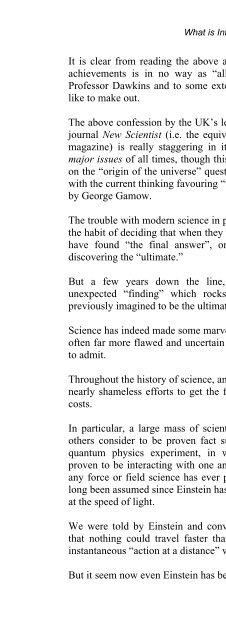07.+What+is+Intelligence+(February+2006) - Get a Free Blog
07.+What+is+Intelligence+(February+2006) - Get a Free Blog
07.+What+is+Intelligence+(February+2006) - Get a Free Blog
Create successful ePaper yourself
Turn your PDF publications into a flip-book with our unique Google optimized e-Paper software.
What is Intelligence? 136<br />
It is clear from reading the above article, that science, despite its great<br />
achievements is in no way as “all knowing” as some scientists like<br />
Professor Dawkins and to some extent physicists like Stephen Hawking<br />
like to make out.<br />
The above confession by the UK’s leading and respected popular science<br />
journal New Scientist (i.e. the equivalent of the US Scientific American<br />
magazine) is really staggering in its admission of ignorance upon the<br />
major issues of all times, though this particular list has not even touched<br />
on the “origin of the universe” question, which also is still under debate,<br />
with the current thinking favouring “the Big Bang Theory” first suggested<br />
by George Gamow.<br />
The trouble with modern science in particular is that its practitioners have<br />
the habit of deciding that when they have made some new discovery they<br />
have found “the final answer”, or are just a mere step away from<br />
discovering the “ultimate.”<br />
But a few years down the line, somebody comes up with some<br />
unexpected “finding” which rocks the current theories, which they<br />
previously imagined to be the ultimate picture of reality.<br />
Science has indeed made some marvellous advances, but we find that is it<br />
often far more flawed and uncertain it its theories than the scientists like<br />
to admit.<br />
Throughout the history of science, amongst the advances, have been some<br />
nearly shameless efforts to get the facts to fit the favoured theory at all<br />
costs.<br />
In particular, a large mass of scientists reject and label “heresy”, what<br />
others consider to be proven fact such as Bell’s “action at a distance”<br />
quantum physics experiment, in which two particles are apparently<br />
proven to be interacting with one another instantly, beyond the effect of<br />
any force or field science has ever previously encountered, which it has<br />
long been assumed since Einstein has the maximum potential of operating<br />
at the speed of light.<br />
We were told by Einstein and convinced up until the Bell experiment,<br />
that nothing could travel faster than the speed of light, and that such<br />
instantaneous “action at a distance” was impossible.<br />
But it seem now even Einstein has been overturned by Bell’s work.


